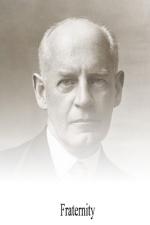Martin grinned.
“And you’ll make that an excuse, I’m certain, for doing nothing.”
Thyme slipped her hand into Hilary’s.
“You are a brute, Martin,” she-murmured.
The young man turned on her a look that said: ’It’s no use calling me a brute; I’m proud of being one. Besides, you know you don’t dislike it.’
“It’s better to be a brute than an amateur,” he said.
Thyme, pressing close to Hilary, as though he needed her protection, cried out:
“Martin, you really are a Goth!”
Hilary was still smiling, but his face quivered.
“Not at all,” he said. “Martin’s powers of diagnosis do him credit.”
And, raising his hat, he walked away.
The two young people, both on their feet now, looked after him. Martin’s face was a queer study of contemptuous compunction; Thyme’s was startled, softened, almost tearful.
“It won’t do him any harm,” muttered the young man. “It’ll shake him up.”
Thyme flashed a vicious look at him.
“I hate you sometimes,” she said. “You’re so coarse-grained—your skin’s just like leather.”
Martin’s hand descended on her wrist.
“And yours,” he said, “is tissue-paper. You’re all the same, you amateurs.”
“I’d rather be an amateur than a—than a bounder!”
Martin made a queer movement of his jaw, then smiled. That smile seemed to madden Thyme. She wrenched her wrist away and darted after Hilary.
Martin impassively looked after her. Taking out his pipe, he filled it with tobacco, slowly pressing the golden threads down into the bowl with his little finger.
CHAPTER XVII
TWO BROTHERS
If has been said that Stephen Dallison, when unable to get his golf on Saturdays, went to his club, and read reviews. The two forms of exercise, in fact, were very similar: in playing golf you went round and round; in reading reviews you did the same, for in course of time you were assured of coming to articles that, nullified articles already read. In both forms of sport the balance was preserved which keeps a man both sound and young.
And to be both sound and young was to Stephen an everyday necessity. He was essentially a Cambridge man, springy and undemonstrative, with just that air of taking a continual pinch of really perfect snuff. Underneath this manner he was a good worker, a good husband, a good father, and nothing could be urged against him except his regularity and the fact that he was never in the wrong. Where he worked, and indeed in other places, many men were like him. In one respect he resembled them, perhaps, too much—he disliked leaving the ground unless he knew precisely where he was coming down again.




